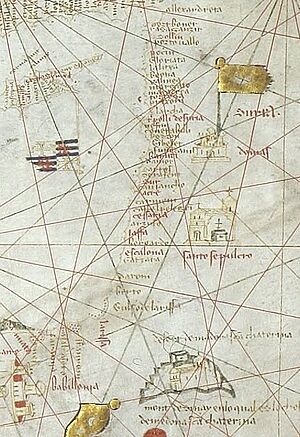Peter II of Cyprus facts for kids
Quick facts for kids Peter II |
|
|---|---|
| King of Cyprus | |
| Reign | 17 January 1369 – 13 October 1382 |
| Predecessor | Peter I |
| Successor | James I |
| Born | ca. 1354 or 1357 Cyprus |
| Died | 13 October 1382 (aged 25-28) Nicosia, Cyprus |
| Spouse |
Valentina Visconti
(m. 1376) |
| House | Poitiers-Lusignan |
| Father | Peter I of Cyprus |
| Mother | Eleanor of Aragon |
Peter II, also known as "Peter the Fat" (French: Pierre le Gros), was a king of Cyprus. He was born around 1354 or 1357 and ruled from 1369 until he died in 1382. He became king when he was still young, after his father, Peter I, was killed. Peter II was also the Count of Tripoli and King of Jerusalem (a title, not a real kingdom at that time).
Contents
Peter II's Life and Reign
Becoming King of Cyprus
Peter II became King of Cyprus on January 17, 1369. He was only about 15 years old when his father, Peter I, passed away. Because Peter II was still a minor, his uncle, John of Lusignan, Prince of Antioch, became the regent. A regent is someone who rules a kingdom when the king is too young.
However, Peter's mother, Queen Eleanor, did not trust John. She believed he was involved in her husband's death. Queen Eleanor wanted to get revenge on those she thought were responsible. She secretly asked other European countries for help.
The Genoese Invasion
The Genoese, a powerful trading city, saw this as a chance to gain power in Cyprus. Queen Eleanor invited them to invade the island. This led to a terrible war for Cyprus.
On January 6, 1372, Peter II was crowned King of Cyprus in Nicosia. Later, he was crowned King of Jerusalem in Famagusta. During the ceremony in Famagusta, a fight broke out between Genoese and Venetian traders. This fight caused a lot of damage and injuries. The Genoese traders were blamed and arrested.
In response, the Genoese sent a large army to Cyprus. Peter II and his advisors decided to make a deal with Emir Teke. They gave up Antalya, a city his father had captured, to focus on the Genoese threat. Peter's uncles, John and James, led the fight against the Genoese.
Capture and Humiliation
The young King Peter and his mother, Eleanor, were in Famagusta. The Genoese tricked their way into the city, pretending to negotiate. They then captured Famagusta, which was a very important port. Peter and Eleanor were taken prisoner.
The Genoese also attacked other cities like Limassol and Paphos. They even entered Nicosia, the capital. Peter's uncles, John and James, bravely defended the castles of St. Hilarion Castle and the town of Kyrenia.
In 1374, Peter was forced to sign a very unfair agreement with the Genoese. This treaty gave Kyrenia and parts of Famagusta to Genoa. Peter also had to pay a huge amount of money to the Genoese. His uncle James had to leave Cyprus. James was arrested by the Genoese on his way out, even though they had promised him safe passage. He would only return years later to become king.
After the War
The Genoese gained many advantages from this war. Before they left Cyprus, they punished those they believed were involved in Peter I's death, as they had promised Queen Eleanor. After the war ended in 1375, Queen Eleanor had Prince John killed.
Queen Eleanor was a very strong-willed person. She often argued with Peter II's wife, Valentina Visconti. Peter decided to send his mother away from Cyprus. Despite her protests, Eleanor returned to Castile in September 1378.
Peter II's Family Life
Peter II married Valentina Visconti from Milan. They were married by proxy in 1376 and in person in Nicosia in 1378. Valentina was the daughter of Bernabò Visconti, a co-ruler of Milan.
Peter and Valentina had one daughter, born around 1379 or 1380. Sadly, their daughter passed away as a baby in Nicosia in 1382. She was buried at St. Dominic's in Nicosia. Before Peter married Valentina, there was a suggestion for him to marry a daughter of the Byzantine Emperor. However, this idea was rejected for political reasons.
Peter II did not have any children who survived him. After his death, his younger uncle, James, became the next King of Cyprus.
Later Years and Legacy
Peter II successfully made a peace treaty with the Sultan of Egypt. He also worked on improving the defenses of Nicosia. He built new fortifications and a royal villa in the village of Potamia. Like his father, he also created his own coins.
Peter II died on October 13, 1382, at the Palace of La Cava in Nicosia. He was buried at St. Dominic's in Nicosia. His reign was a difficult time for Cyprus, marked by the loss of important lands and the damaging war with Genoa.
Images for kids
 | Kyle Baker |
 | Joseph Yoakum |
 | Laura Wheeler Waring |
 | Henry Ossawa Tanner |



